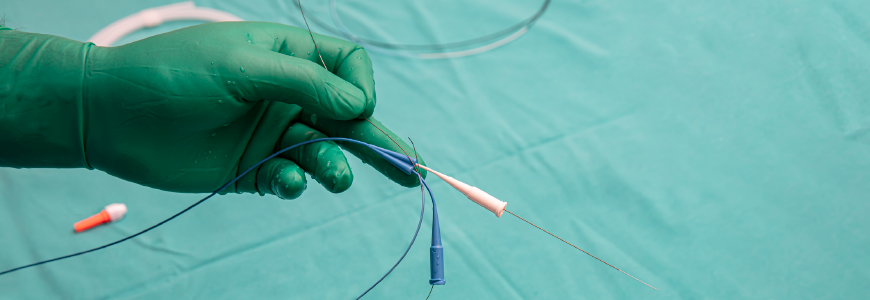As the prevalence of resistant hypertension (RH) continues to rise, so too does the risk of cerebrovascular, cardiovascular, and kidney disease. Using a minimally invasive catheter approach called renal denervation, Duke Health is one of the few active programs in the United States now offering this FDA-approved procedure that may lower blood pressure and reduce the number of medications patients need.
“Renal denervation has been heavily studied in trials in the U.S. and Europe,” says interventional cardiologist W. Schuyler Jones, MD, Duke’s director of Invasive Services and the Cardiac Catheterization Laboratories. He also serves as a liaison for the American Heart Association/American College of Cardiologists Joint Committee on Practice Guidelines. “We’re happy to offer the procedure to our patients along with other treatments like medication options for patients in our resistant hypertension clinic or other clinics.”
Denervation procedure
For the minimally invasive procedure, the interventional cardiologist accesses the renal arteries via the femoral artery, requiring only small incisions in the legs. Brief pulses of radio frequency energy are applied using four poles on the sides of the blood vessel wall to deliver ablation to the renal afferent nerves. Interrupting signals between the afferent and efferent nerves has been shown to lower blood pressure. The outpatient procedure takes under an hour, allowing patients to return home the same day for a quick recovery.
Patients typically see a decrease of 10 to 15 mm Hg in systolic blood pressure after a few weeks. “In some cases, patients have regained full control of their blood pressure and can discontinue medication,” says Jones. “The main potential benefit is lowering the long-term risk of heart attack and stroke.”
Referring for denervation
Physicians should keep the possibility of denervation in mind during the course of RH treatment. “Once patients have failed a second medication, start thinking about referral,” says Jones. However, patients with secondary hypertension due to renal artery stenosis or who are nearing or on dialysis may not be good candidates for the procedure.
“In general, if referring physicians have patients who have tried two or three (or more) blood pressure medications and are not controlled, we’d like to have a chance to offer this treatment for them,” Jones continues. “We are happy to manage long-term hypertension care if clinicians prefer, but our goal is to get patients back to providers in their local communities.”
